UAE Suspends Tourist and Work Visas for These Nine Countries
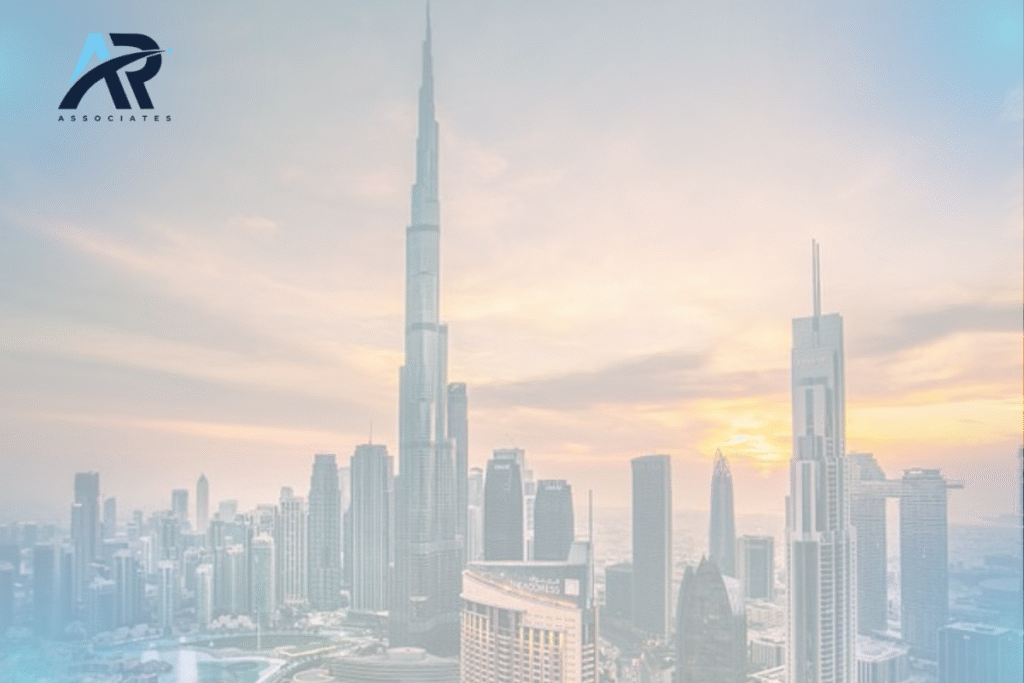
The UAE has updated its visa rules as part of its 2026 strategy. Reports confirm that tourist and work visas are suspended for citizens of nine countries. While not declared as a permanent ban, the move highlights stricter immigration checks. Countries Affected The suspension impacts nationals from: Travelers from these nations have faced high rejection rates since late 2025. Immigration experts note this as a “visa freeze,” not a full ban. Why the Suspension? The UAE has not issued an official statement. But based on past visa reviews, several reasons are likely: Authorities are expected to review the decision as part of the broader 2026 visa strategy. What This Means for Travelers Travelers from affected countries cannot apply for new tourist or work visas at the moment. Business trips, family visits, and job placements may all be delayed. Some may still qualify under exceptional categories, but only through direct approval from UAE immigration. Key Points for All Foreign Nationals The UAE continues to tighten visa processing for all applicants. Every traveler must: Even unaffected countries should expect closer checks on documentation. Connection to UAE’s 2026 Strategy The UAE visa suspension 2026 reflects the country’s focus on balancing growth and security. Stricter controls protect the labor market while keeping investment pathways open. At the same time, the UAE visa suspension 2026 highlights the importance of planning ahead. Businesses and workers should prepare for longer processing times and stricter checks. Final Word Visa suspensions often reflect short-term geopolitical and security pressures. They may ease once conditions improve. Travelers should always confirm visa rules with UAE embassies or immigration authorities before making plans. Need expert help with UAE visa rules, compliance, and business setup? AR Associates provides trusted guidance for individuals and companies navigating these changes. Contact AR Associates today to stay compliant and secure your future in the UAE.
Emirates Reminds Passengers: New Travel Rule Kicks in This October
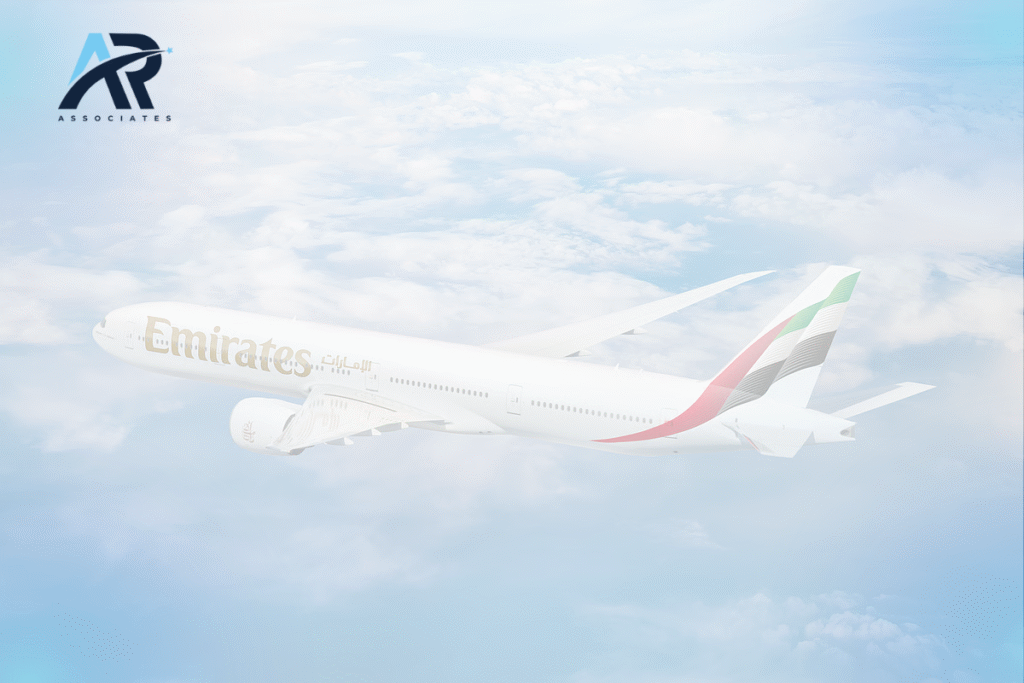
Emirates has issued a reminder about updated rules for carrying power banks on board. These changes will take effect October 1, 2025. From that date, passengers cannot use or charge power banks during flights. The airline said passengers may carry one power bank per person. The device must stay in cabin baggage and cannot exceed 100 watt-hours (Wh). Power banks are not allowed in checked luggage. What Passengers Need to Know These rules apply to all Emirates flights and are part of the airline’s safety measures. Travelers should review Emirates travel rules before flying. Why the Change? Safety First Emirates introduced these rules after a safety review. Lithium-ion batteries, like those in power banks, can pose risks if overcharged or damaged. They can overheat, catch fire, or release toxic gas. The airline explained that damaged batteries may trigger thermal runaway. This occurs when a battery generates heat faster than it can release, causing rapid temperature rise. Thermal runaway can lead to fires, explosions, and toxic fumes, which are dangerous on flights. Rules on Personal Electronic Devices Emirates also reminded passengers about limits on personal electronic devices (PEDs). Travelers may carry up to 15 devices, which must be packed separately and not attached to other items. Improperly packed devices or excess items may be confiscated. Motorized devices such as hoverboards, smart bags, and mini Segways are prohibited on Emirates flights. These items contain large lithium batteries and cannot be carried, even if allowed by other airlines. Checking International Rules Passengers should also check customs regulations before flying. Rules for electronics, alcohol, cigarettes, and medications vary by country. This helps avoid confiscation or fines. Etihad recently clarified that up to 15 electronic devices can be carried in cabin or checked baggage. Checked devices must be fully powered off and protected from damage. Spare batteries, power banks, and e-cigarettes are never allowed in checked luggage. Preparing for Travel To comply with the new rules, passengers should: Following these steps will ensure a smooth flight and prevent delays at security. Emirates urges passengers to review its Dangerous Goods Policy for complete details. These updates reflect the airline’s commitment to passenger safety while maintaining convenience. Travelers planning trips this October should be aware of Emirates travel rules and follow them closely for a safe and hassle-free journey. Need expert guidance on travel regulations or compliance? AR Associates can help you navigate all airline rules and ensure smooth travel. Contact AR Associates today for personalized support.
UAE’s Real GDP to Accelerate to 5.3% in 2026, Central Bank Says
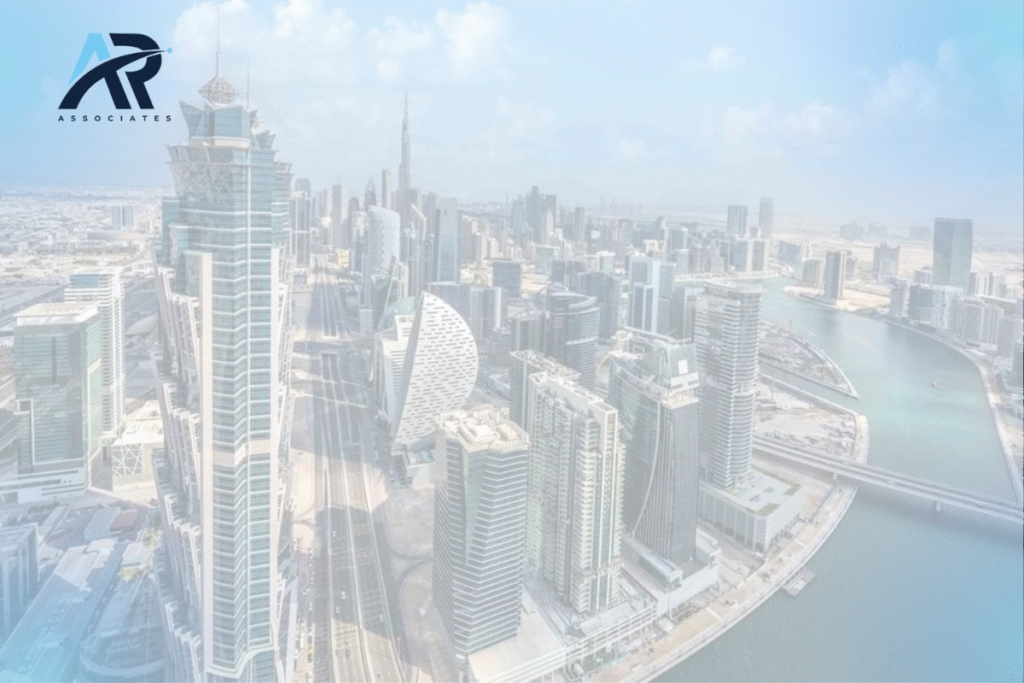
The UAE’s real GDP is set to grow by 4.9% in 2025 and accelerate to 5.3% in 2026, according to the Central Bank of the UAE (CBUAE). This growth reflects strong performance in non-hydrocarbon sectors and a rebound in oil output supported by updated OPEC+ plans. In the first quarter of 2025, the UAE’s economy grew by 3.9% year on year. The non-hydrocarbon sector expanded by 5.3%, led by manufacturing, financial services, construction, and real estate. These sectors continue to drive the country’s economic diversification. Non-Hydrocarbon and Hydrocarbon Growth The CBUAE forecasts the non-hydrocarbon sector will grow by 4.5% in 2025 and 4.8% in 2026. Meanwhile, the hydrocarbon sector is expected to expand by 5.8% in 2025 and 6.5% in 2026. This balance underlines the UAE’s commitment to both energy and non-energy sectors. Inflation eased to 0.6% in Q2 2025, mainly due to lower energy costs. The central bank revised its 2025 inflation forecast downward to 1.5%, with a moderate rise to 1.8% expected in 2026. Banking and Financial Sector Resilience Liquidity remains stable, supported by strong deposit growth and sustained credit expansion. The UAE banking system is well-capitalized, with a capital adequacy ratio of 17.3% in Q2 2025. Asset quality improved as the net non-performing loan (NPL) ratio fell to 1.7%. Deposits rose 13.1% year on year, while loans expanded 11.1%. The insurance sector also strengthened, with gross written premiums up 14.5% in H1 2025. Capital ratios in insurance rose to 423% of minimum requirements, showing robust financial stability. Capital Markets and Real Estate Dubai and Abu Dhabi’s stock markets performed strongly. The Dubai Financial Market’s index surged 35.6% year on year, while Abu Dhabi’s index rose 8.1%. Low credit default swap spreads reflect investor confidence. Residential real estate sales increased 13.7% in the first five months of 2025. Off-plan sales rose 14.3%, and ready unit sales grew 12.5%. However, rental transactions in Dubai and Abu Dhabi fell 4.2%. Tourism and Aviation Tourism remains strong. Dubai welcomed 9.9 million international overnight visitors in H1 2025, a 6.1% increase from last year. Abu Dhabi and Dubai airports handled over 15.8 million and 46 million passengers, respectively, showing healthy aviation demand. Global Outlook and Monetary Policy The IMF forecasts global growth of 3.0% in 2025, with the US at 1.9% and the euro area at 1.0%. Emerging markets are projected to grow 4.1% in 2025, slowing slightly to 4.0% in 2026. The GCC region is set to outperform, with growth accelerating from 1.8% in 2024 to 3.5% in 2025, led by strong performance in the UAE and Saudi Arabia. Global inflation is expected to decline from 5.7% in 2024 to 3.6% in 2026. In line with the US Federal Reserve, the CBUAE maintained its base rate at 4.4% in July, lowering it to 4.15% recently. The dirham overnight rate (Donia) averaged 9 basis points below the base rate after introducing the overnight murabaha facility. Balance Sheet and Foreign Assets The CBUAE’s balance sheet expanded by Dh43.6 billion in Q2 2025, mainly due to higher net foreign assets. This supports the UAE’s financial stability and strengthens confidence in UAE’s real GDP growth prospects. With strong non-oil growth, resilient banking, and robust real estate and tourism sectors, the UAE is well-positioned for sustainable economic growth. Businesses seeking investment opportunities can rely on AR Associates for guidance and support in the UAE market. Contact AR Associates today to explore the potential of UAE’s growing economy.
Dubai Records Global Highest Number of Greenfield FDI Projects in Half-Year Since 2003

Dubai has set a global record by attracting the most Greenfield foreign direct investment (FDI) projects in a single half-year since 2003. In the first half of 2025, the emirate secured 643 Greenfield FDI projects. This is 478 more than the second-placed city and marks the highest number ever recorded worldwide in a half-year period. The achievement underlines Dubai’s growing role as a hub for international investment. Sheikh Hamdan bin Mohammed bin Rashid Al Maktoum, Crown Prince of Dubai, highlighted that this success aligns with the Dubai Economic Agenda, D33, which targets doubling the emirate’s economy by 2033. Strategic Location and Investment Appeal Dubai’s location at the crossroads of Asia, Europe, and Africa makes it ideal for global business. The city has built a strong investment ecosystem with clear regulations, modern infrastructure, digital-first services, and excellent global connectivity. This attracts companies looking for a safe and forward-looking destination. In the first half of 2025, Dubai ranked second globally for total Greenfield FDI capital, up from fourth in 2024. It also moved to third place globally for jobs created through inward FDI, an increase from fourth place last year. In both measures, Dubai remains the number one city in the Middle East. These results show the growing appeal of Dubai foreign investment across sectors. Growth in Headquarters and Emerging Sectors Dubai is also a preferred base for headquarters of multinational firms. The city secured the global top spot for HQ FDI projects, rising 60% from 20 projects in H1 2024 to 32 in H1 2025. The emirate leads in key sectors such as ICT and electronics, creative industries, professional services, life sciences, consumer goods, financial services, transportation, and environmental technology. Dubai is also a leader in emerging fields like Artificial Intelligence (AI) and Financial Technology (FinTech). With a global market share of 8% and 56% of the Middle East’s Greenfield FDI projects, Dubai has established itself as a major international investment hub. This highlights the continuing growth of Dubai foreign investment globally. Capital and Job Growth The Dubai FDI Monitor shows the emirate attracted Dh40.4 billion ($11 billion) in estimated FDI capital in H1 2025. This is a 62% increase from Dh24.7 billion ($6.8 billion) in H1 2024. The number of FDI projects rose 28.7%, from 847 to 1,090. Jobs created through inward FDI increased 46.7%, reaching 38,433 positions. Investment was diverse. Greenfield projects accounted for 52.4% of inflows, while new forms of investment made up 36.1%. Other contributions came from reinvestments (4%), venture capital (4.3%), and mergers and acquisitions (3.2%). Sectors included business services, consumer products, food and beverages, software and IT services, financial services, real estate, tourism, and transport. Sector and Function Distribution Business services led in capital inflows with 31.3%, followed by construction (28.6%), retail (10.7%), logistics and transportation (7.8%), and manufacturing (7.5%). In project numbers, retail dominated with 36.6%, then business services (30.7%), sales and support (21.3%), headquarters (2.9%), and logistics (2.4%). This spread shows investor confidence in Dubai’s ability to support diverse operations, from headquarters to logistics, manufacturing to retail. Leading Source Markets The top five countries contributed 68.7% of total FDI capital in H1 2025. The United States led with 35%, followed by the UK (10.6%), France (8.9%), India (8.9%), and Saudi Arabia (5.2%). For project numbers, the top five countries contributed 56%, led by the UK (16.2%), US (14.9%), India (14.9%), France (5.4%), and Italy (4.6%). Top Sectors by Capital and Projects The top five sectors accounted for 72% of total capital and 69% of total projects. Leading sectors by capital were business services (30.6%), hotels and tourism (21.3%), transportation and warehousing (7.2%), consumer products (6.6%), and real estate (6.3%). By project numbers, top sectors were business services (19%), consumer products (16.5%), food and beverages (15%), software and IT (11%), and financial services (6.6%). Dubai’s first-half performance in 2025 shows record-breaking Greenfield FDI, capital growth, job creation, and sector diversity. The city continues to stand as a global leader in Dubai foreign investment. Looking to invest in Dubai? AR Associates can guide your business through every step of setting up and expanding in the emirate. Contact AR Associates today to explore opportunities in Dubai foreign investment.
How to Apply for the UAE 10-Year Blue Residency Visa for Environmental Experts

The UAE has introduced the Blue Residency Visa, a 10-year permit for environmental experts. It aims to bring leading minds in sustainability, climate change, and energy to the country. This long-term visa supports the UAE’s push for stronger environmental, social, and economic growth. Who Can Apply? The Blue Residency Visa is open to individuals with proven impact in environmental work. Eligible applicants include: Applicants must show evidence of real contributions. This may include research papers, global awards, or documented work in major projects. Key Requirements Applicants need to prepare documents that prove their role in advancing environmental protection. Required items include: Additional documents may be required based on the applicant’s category, such as academic records or proof of investment in sustainability. Step 1: Apply for Nomination Before starting the visa application, a nomination is needed. Applicants can submit a nomination request through the Federal Authority for Identity, Citizenship, Customs and Port Security (ICP) at smartservices.icp.gov.ae. Step 2: Submit the Visa Application After receiving approval, you can move forward with the official visa process. Applicants inside the UAE must update their residency status. Applicants outside the UAE can apply for a six-month multiple-entry visa to complete procedures. This entry visa costs AED 1,250. During the application, you must provide: Supporting documents must be uploaded along with the visa service fee. Where to Apply Applications can be made through: Why the Blue Residency Visa Matters This visa is more than just long-term residency. It rewards individuals who dedicate their careers to protecting the planet. Holders can live and work in the UAE for 10 years, while contributing knowledge and skills to advance sustainability. The program also strengthens the UAE’s role as a global leader in climate action. By welcoming experts in green fields, the country builds capacity for renewable energy, sustainable development, and climate adaptation. Final Thoughts The UAE Blue Residency Visa is a major step in connecting opportunity with responsibility. For environmental experts, it offers a secure future in a country that values sustainability. If you are a scientist, researcher, or advocate in this field, prepare your documents and apply through the ICP platform. A decade-long residency in the UAE could be the next step in your journey to create lasting impact. Looking to apply with ease? Contact AR Associates for expert guidance on UAE Blue Residency Visa applications. Our team ensures your documents, nominations, and submissions are handled smoothly.
How to Register Your Management Consultancy Business in Dubai

Dubai is a major hub for consultancy services. The city’s strong economy, diverse industries, and global links make it ideal for management consultants. With more firms seeking expert advice, demand for consultants continues to grow. Setting up a consultancy here can be a smart move—if you follow the right steps. Why Register in Dubai? The consulting market in the UAE is one of the largest in the GCC. Reports show steady growth, with businesses across industries seeking expert guidance. For management consultants, this creates strong opportunities. Dubai also offers benefits such as: With these factors, many professionals consider business registration in Dubai a practical choice. What a Consultancy License Covers A management consultancy license allows you to provide a wide range of services. These may include: This flexibility makes it possible to serve clients across multiple sectors. Steps to Register Your Consultancy Starting a management consultancy requires planning and proper documentation. Here’s how the process works: 1. Define Your Business Structure Decide whether you want to set up on the mainland or in a free zone. 2. Choose a Trade Name Select a unique name that follows Dubai’s naming rules. Avoid offensive words or references to religion. 3. Submit the Initial Application Apply to the Department of Economic Development (DED) if setting up on the mainland, or to the relevant free zone authority. This stage involves outlining your planned activities. 4. Prepare Documents You will need: 5. Draft the Memorandum of Association (MOA) For mainland setups, you must sign an MOA that outlines company ownership and activities. Free zone setups may require standard incorporation documents. 6. Get Approval The relevant authority will review your documents. If everything is in order, you will receive approval to proceed. 7. Pay Fees and Receive License Once approved, pay the license fee. A digital copy of your consultancy license is issued, and the original can be collected later. Costs Involved The cost of registering a management consultancy in Dubai varies. Factors include business location, office space needs, and visa packages. On average, fees start from AED 15,000 but can be higher depending on setup. Visa Options As a license holder, you can apply for residency visas for yourself, family, and staff. The number of visas depends on office space and license type. Final Thoughts Dubai continues to attract consultants from across the globe. With high demand for management advice and a supportive business environment, the city offers long-term potential. By completing the steps for business registration in Dubai, consultants can unlock access to one of the region’s strongest markets. Whether on the mainland or in a free zone, the process is clear and achievable with the right preparation. Need help setting up your consultancy? AR Associates offers expert support for business registration in Dubai. From trade name selection to licensing and visas, Our team ensures a smooth and stress-free process.
How to Retire in Dubai and Apply for a 5-Year Expatriate Retirement Visa
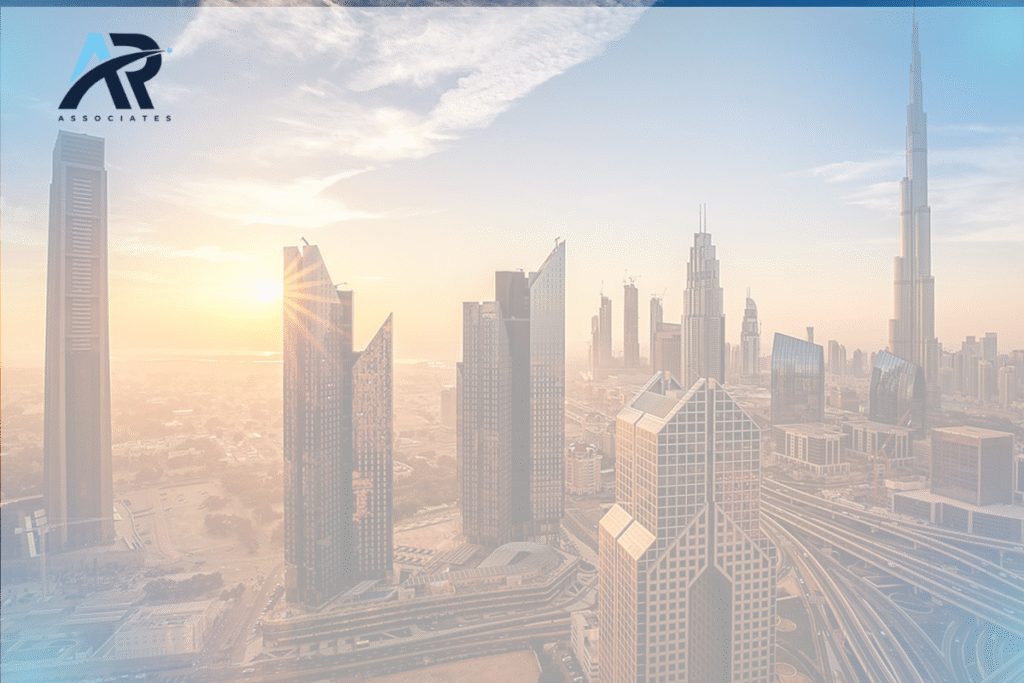
Dubai is a top choice for retirees. The city offers safety, comfort, and a high standard of living. To support older residents, Dubai launched a 5-year expatriate retirement visa. This option gives long-term security for those wishing to stay. Who can apply Applicants must be at least 55 years old. They also need to meet one of several financial conditions. Meeting any one of these options allows you to apply. Required documents Applicants need to prove both age and financial eligibility. Common documents include: If applying from abroad, ensure official documents are translated into Arabic and attested. How to apply Applications are submitted through the General Directorate of Residency and Foreigners Affairs (GDRFA) in Dubai. The process usually involves: The visa is valid for five years and can be renewed if the applicant still qualifies. Benefits of retiring in Dubai The visa allows retirees to live in Dubai with peace of mind. They can access healthcare, maintain a local bank account, and sponsor family members under certain conditions. The city also provides world-class facilities, modern housing, and a strong sense of safety. For many, the 5-year retirement visa Dubai program means more than just legal residence. It opens the door to stable living in one of the most secure and vibrant cities worldwide. Final word Retiring in Dubai is now simpler thanks to clear eligibility rules and the dedicated visa program. With the right planning and documents, applicants can secure long-term residency and enjoy the city’s lifestyle without stress. The retirement visa Dubai system ensures that those who meet financial requirements can look forward to a stable future in the UAE. Need help with your retirement visa process? AR Associates provides expert guidance on eligibility, documents, and applications. Contact AR Associates today to make your retirement in Dubai smooth and secure.
How to Register Your Real Estate Business in Dubai
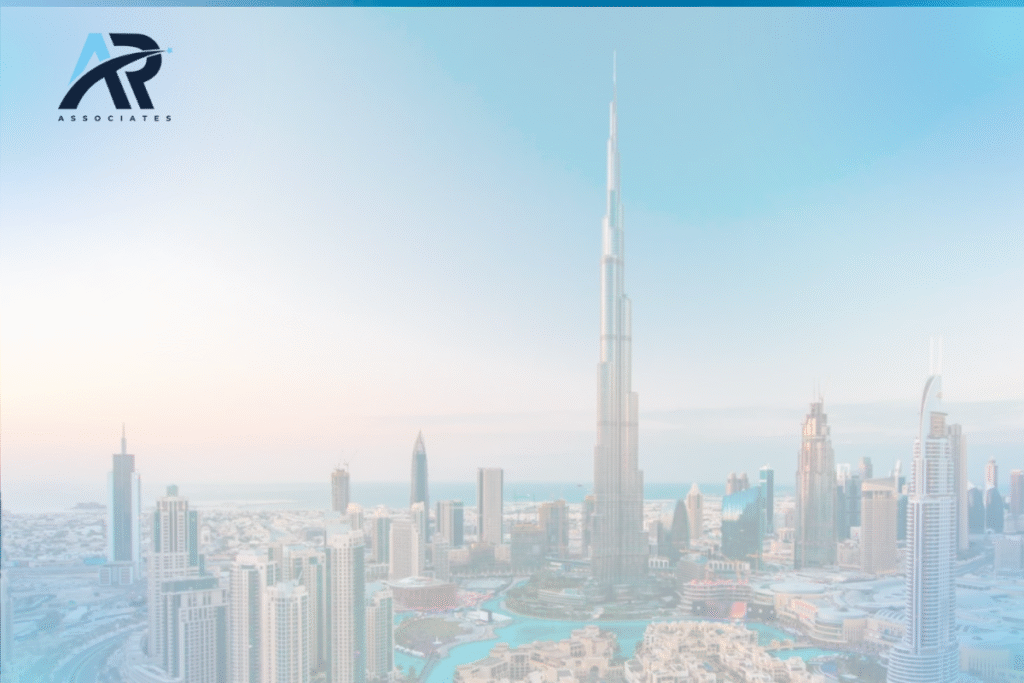
Dubai’s property sector continues to attract investors, brokers, and entrepreneurs. The city offers strong returns and a clear legal framework. If you want to start a real estate company here, the process involves several regulated steps. Step 1: Decide your business activity Real estate in Dubai covers different activities: brokerage, leasing and property management, consultancy, or development. Each has separate rules. For example, brokers must get approval from the Real Estate Regulatory Agency (RERA), while developers need to show capital reserves and open escrow accounts with the Dubai Land Department (DLD). Step 2: Choose mainland or free zone You can set up on the mainland or in a free zone. A mainland license lets you deal directly in Dubai’s property market without restrictions. A free zone license offers benefits like tax breaks and 100% ownership. But, to act as a broker in Dubai, you still need DLD and RERA approval even if registered in a free zone. Step 3: Reserve a trade name The Department of Economy and Tourism (DET) handles this. Your chosen name should not violate naming rules and must reflect your business activity. Once approved, you can move to initial registration. Step 4: Secure initial approval You’ll submit passport copies, visa pages, and business details. DET will confirm your activity is legal. This step clears the way for license application. Step 5: Lease an office space Real estate firms in Dubai must have a registered office. The lease must be recorded through Ejari, the tenancy registration system. RERA also requires a minimum office size for brokerages, usually starting from 200 square feet. Step 6: Prepare legal documents If you’re forming a company with partners, draft a Memorandum of Association (MOA). This defines roles, capital share, and responsibilities. The MOA must be notarized in Dubai. Step 7: Apply for a trade license Using your documents, apply through DET (mainland) or a free zone authority. The license must list your real estate activity, such as brokerage or consultancy. This is your legal right to operate. Step 8: Complete RERA training and certification Anyone working as a real estate broker in Dubai must pass RERA training. The Dubai Real Estate Institute provides this course. After passing the exam, you’ll get a Broker ID, which is mandatory for client dealings. Step 9: Register with DLD and Trakheesi Your company must be added to the DLD registry and Trakheesi system. Trakheesi permits are needed before advertising or listing properties. Without this, you cannot legally market real estate in Dubai. Step 10: Open a corporate bank account UAE banks require your trade license, MOA, office lease, and shareholder details. Expect compliance checks since real estate is a high-value sector. The process may take up to three weeks. Step 11: Hire staff and arrange visas Depending on office size and activity, you can apply for residency visas for staff and brokers. This includes Emirates ID, labor cards, and medical insurance. Costs to expect Initial setup can range from AED 45,000 to AED 100,000. Main expenses include trade license fees, RERA training, Ejari registration, and office rent. Annual renewals and marketing add to ongoing costs. Why Dubai is attractive Dubai’s real estate sector is well-regulated and transparent. Authorities like DLD and RERA maintain high standards, ensuring trust for investors and buyers. With clear steps for registration, entrepreneurs have a solid framework to operate and grow. Final word Setting up a real estate company in Dubai requires planning, approvals, and compliance. From trade licenses to RERA training, every step matters. By following regulations and securing the right structure, you can build a business that thrives in one of the world’s most dynamic property markets. Business Registration in Dubai is not only straightforward but also rewarding for those who prepare well. Partnering with experts in Business Registration in Dubai can further ease the process and ensure long-term success. Looking to register your real estate company in Dubai hassle-free? AR Associates offers end-to-end support, from licensing to RERA certification. Contact AR Associates today and launch your business with confidence.
Dubai vs. London: Why UK’s Wealthy Entrepreneurs Are Choosing the UAE
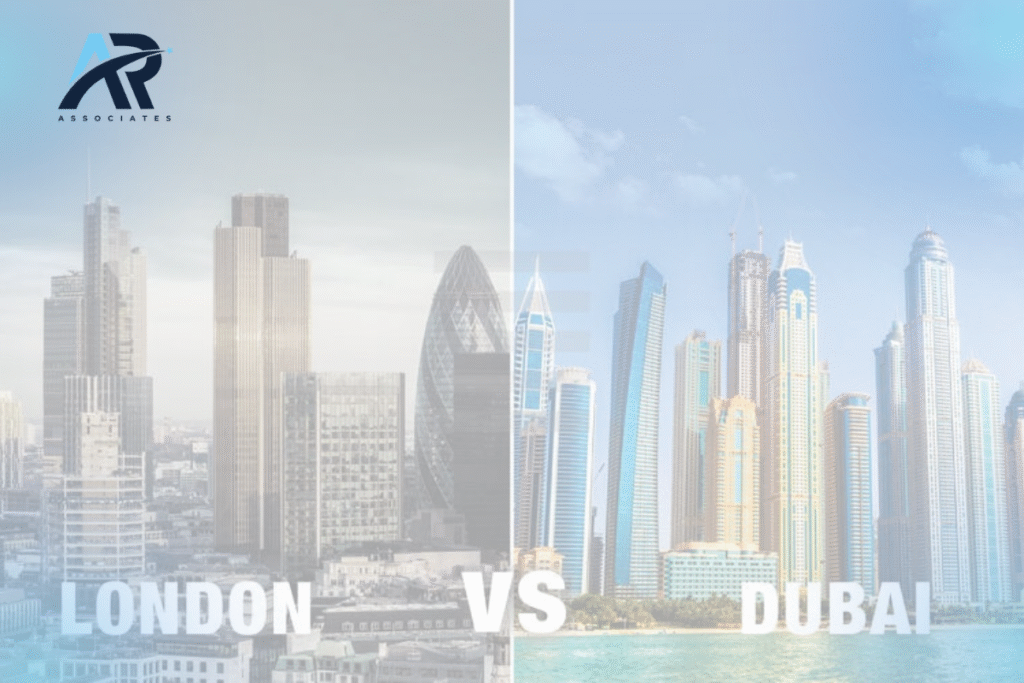
London has long been a magnet for the wealthy. But rising taxes, higher costs, and political uncertainty are driving many British entrepreneurs to look abroad. Increasingly, their destination of choice is Dubai. The Tax Factor The UK has seen talk of new wealth taxes and stricter rules for high earners. For entrepreneurs who want to protect their profits, this is worrying. In Dubai, there is no personal income tax. Company profits are not eaten away by government levies, allowing owners to reinvest more of their money. This difference alone is pulling business leaders from the UK to the UAE. Stability and Growth The UK economy has slowed in recent years, while inflation and policy shifts add pressure. Dubai, by contrast, has posted steady growth. Government reforms, major infrastructure projects, and strong global trade links make it one of the most stable places for investors. For business owners who want predictability, Dubai offers a clear edge. Residency Options The UAE has introduced visas that appeal to high-net-worth individuals. The Golden Visa allows long-term residency for entrepreneurs, investors, and their families. This means security and stability without the stress of short-term renewals. For UK citizens tired of Brexit complications and tighter immigration rules, this is a welcome change. Lifestyle and Location London is known for culture and heritage. But many entrepreneurs now prefer Dubai’s modern lifestyle. The city offers luxury housing, top-rated healthcare, and world-class schools. Its airport connects directly to Europe, Asia, and Africa, making it easy for global business owners to travel. The sunshine and safety are added bonuses that London struggles to match. Real Estate Appeal Property in London has become less attractive due to high prices and low rental yields. Dubai, on the other hand, offers strong returns. Rental yields average 6-8%, compared to London’s 3-4%. Properties are more affordable per square foot, yet still deliver high-quality living. For many entrepreneurs, this makes Dubai’s property market a smart investment as well as a lifestyle choice. Business Advantages Entrepreneurs find setting up companies in Dubai far simpler than in the UK. Free zones allow 100% foreign ownership and come with reduced red tape. The city is also positioning itself as a hub for technology, finance, and trade. With so many business opportunities in Dubai, it’s no surprise that wealthy founders see it as a natural base for expansion. The Bigger Picture This shift is not small. Reports show thousands of UK company directors have already moved abroad, many choosing Dubai. A growing number of British nationals are also among the top investors in Dubai real estate. Surveys reveal that over half of wealthy UK citizens would consider leaving if new taxes are introduced. Final Takeaway Dubai is competing with London not just as a business hub, but as a place to live, invest, and grow wealth. Tax relief, flexible visas, modern infrastructure, and profitable real estate make it highly attractive. For UK entrepreneurs who want to protect and grow their success, the UAE is no longer an alternative—it is becoming the first choice. Looking to explore business opportunities in Dubai? AR Associates can guide you through every step, from setup to growth. Contact us today and take your next move with confidence.
Get a Dubai Work Visa: Your Guide to Employment Authorisation
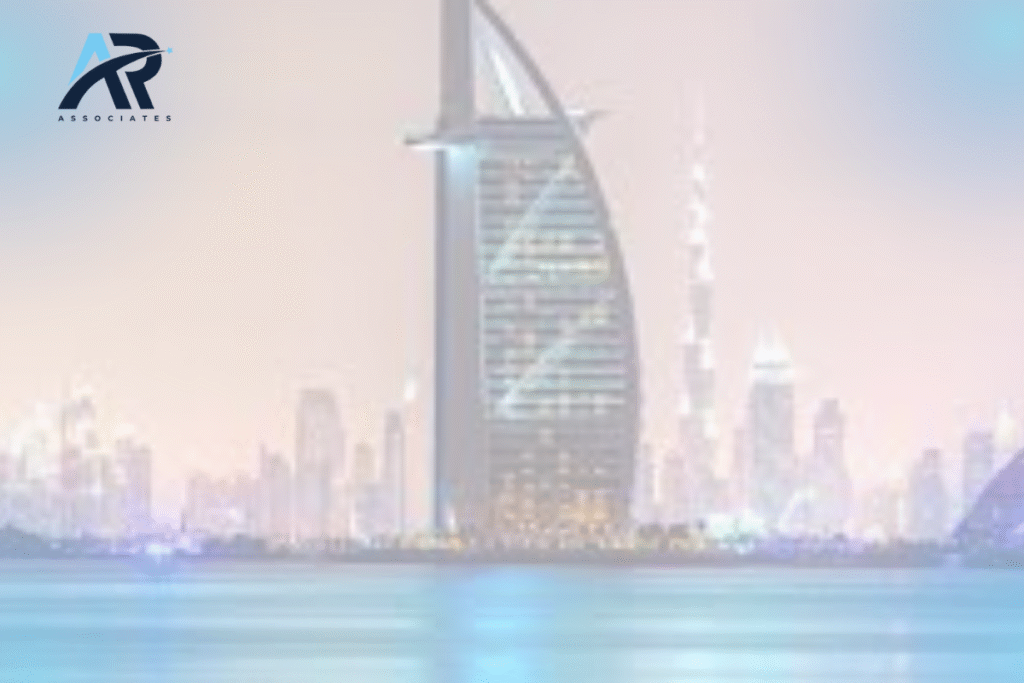
Dubai attracts thousands of professionals each year. High salaries, tax-free income, and a safe lifestyle make it a global hub for workers. But to legally work there, foreign nationals need proper authorisation. That means securing a work permit and a Dubai Work Visa. Work Permit vs. Work Visa Many confuse these two. A work permit lets an employer hire you. It is issued by the Ministry of Human Resources and Emiratisation (MoHRE). But the permit does not grant entry. For that, you need a work visa. The work visa acts as your entry ticket. It allows you to enter Dubai and start the steps needed for residency. Without both documents, you cannot legally work in the UAE. Types of Work Visas in Dubai Dubai offers several routes depending on your role and plans: Each category has its own requirements, costs, and processing times. Eligibility and Requirements To qualify, you need: Employers must also provide a valid trade license and submit an employment contract registered with MoHRE. The Application Process Here is how the process usually works: Processing can take one to two months. Costs vary by visa type, employer classification, and additional services. Costs to Expect The overall price usually falls between AED 3,000 and AED 7,500. This includes: Employers often cover these expenses, but not always. Clarify this before signing a contract. Free Zone vs. Mainland Employment Dubai has over 20 free zones. Each has its own rules. Companies in free zones can hire expats directly without a local sponsor. But their employees may be limited to working within that zone. Mainland visas allow work anywhere in the UAE but often require a local partnership. Why Dubai’s Work Visas Matter With 88% of its population made up of expats, Dubai relies on foreign talent. The visa system ensures workers are properly documented and protected under UAE labour law. Skipping the process or working on a visit visa is illegal and risks fines or deportation. Final Thoughts Securing a Dubai Work Visa is the first step toward building a career in one of the world’s fastest-growing cities. Whether you’re a skilled employee, a freelancer, or an investor, there is a pathway tailored to your needs. Preparation, accurate documentation, and following official procedures are the keys to success. Need expert guidance with your Dubai Work Visa? AR Associates is here to simplify the process and ensure a smooth, hassle-free experience. Contact us today to get started!

